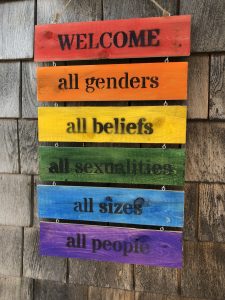In “Economics lesson from McKinsey regarding the homeless in Seattle” I wondered the following:
The McKinsey geniuses don’t answer the question that always strikes me when I’m in Seattle and I see homeless folks camping in the cold rain: Since these unfortunate souls don’t have a job or a house, why don’t most of them move to Santa Monica and camp in a warm dry climate?
It seems that quite a few have done this! From a recent NYT, “In Los Angeles, Where the Rich and the Destitute Cross Paths”:
In recent years, homelessness has leapt beyond its old boundaries, with more than 53,000 people living without homes this year. This means that Angelenos are encountering homeless people in places they never did before.
For many in Los Angeles, the spread of homelessness is a challenge to their identities as political progressives. Some are angered by the presence of the homeless and some communities have mobilized to keep shelters out of their neighborhoods.
Los Angeles Mayor Eric Garcetti has called homelessness the “moral crisis of our time,” and voters have approved millions of dollars to tackle the issue.
Across Los Angeles communities oppose new housing for the homeless. “It’s fear of the other,” [John Maceri, executive director of The People Concern, a social services agency] said. “It’s ‘those people.’ It’s ‘them.’”
“Millions of dollars”? Enough to buy one third of a house in Santa Monica, in other words? (well, not one third of a nice 15,000 square foot house, nor anything in the Bel Air neighborhood) And this will substantially assist 53,000 homeless people?
How is it that in a place where nearly everyone votes for Democrats and professes a desire to help the “vulnerable,” the only person that the reporter could find with a kind word for the local homeless is Mr. Maceri, a guy whose paycheck depends on the continued supply of local homeless?
The reader comments are kind of interesting:
cbarber from San Pedro: If i was homeless(i’m one paycheck from the street) LA is where I’d want to live. The weather is great and you wouldn’t have to worry about freezing to death at night.
Reader In Wash, DC: Another reason to crack down on illegal aliens. According to Pew Research there are 500,000 illegal aliens in NY metro area. If they double and triple up and they do to save cost even at 10 people per unit that is 50,000 housing units off the market. Why bleeding heart liberals want to turn the US into a 3rd world slum is a mystery.
Papaya in Belmont, CA: Same with us “empathetic” Bay Area residents. We support the disadvantaged and poor in theory but NIMBY. We consistently reject most ballot measures that may even allow our teachers, police and fire departments to actually live in the cities they serve. If those with middle class salaries won’t be helped, how do homeless people have a chance?
Aaron (A-aron?) in Orange County: Why can’t we send these people to Detroit? Detroit has thousands of empty tract homes and open land.. We just need a few billion dollars to re-build the place. In addition, if European nations decided to contribute they can send their immigrants to us. Detroit can be a worldwide refuge for homeless and immigrant populations. A convergence of diversity and creativity.
GeorgePTyrebyter, Flyover, USA: There is a simple reason that LA has this crisis: the tidal wave of illegals. Illegals drive up the cost of rental housing, by increasing demand. They take the low-end jobs. That 18YO-19YO couple would in years past been able to get jobs dishwashing or other low end jobs, but these are taken by illegals. Schools in CA are being destroyed by the cost of ESL and the needs to take care of far more kids than planned for. Illegals need to be booted, to allow US citizens to live in the US.
DickeyFuller, DC: But I am not for giving them housing in the expensive cities of Washington, NY, Boston, SF, LA and Seattle. If middle class folks cannot afford to live there then there is reason for them to expect we will house them there. No. You don’t get to pick your free housing. We’ll build homeless housing in states where the cost of living is dirt cheap — Oklahoma, for example. Way upstate New York. The rural South.
sob, Boston: Thanks to the NYT to bring this issue to light. Seems to me that the liberal California politicians, who have had complete control of both houses and the governorship have shown the country their true contempt for the poor. The more they talk the worse the poverty gets, and yet the mostly liberal media can’t bring themselves to tell the truth.
Scott, Los Angeles: Homeless is the new scam industry to keep city employees/agencies busy and justify the jobs of the people that work there. … Santa Monica is paying their Homeless Director $150K+yr. Her only credential – a self chosen degree from a for profit diploma mill AND she got canned by the city of LA prior!
William Case: The U.S. Census Bureau now publishes an annual poverty report titled the Supplemental Poverty Measure that takes regional cost of living into account. The report is changing perceptions regarding which states are rich and which are poor. The most recent report shows that California is by far the poorest state, with 20.4 percent of its residents below poverty level. The poverty rate in often maligned Mississippi is 16.9. The national average is 14.7
Jack Wagner, Los Angeles: Homelessness is a symptom of overpopulation. The US population has increased by 36% since we passed the Immigration Reform Act of 1986 which was supposed to end illegal immigration.
SC, Venice: The Palisades raised $750k to send all their homeless to Venice. The Palisades are the ultimate NIMBY’s: no facilities in their community to help the homeless, just raise loads of cash to ship them next door.
Back when U.S. population was around 200 million it was fashionable to at least feign sympathy for the homeless. Now these virtuous California-dwelling, Hillary-voting, NYT-subscribing folks aren’t even bothering to make that effort.
Readers: Do you agree that NYT subscribers are going to be the most sympathetic large audience that could be found for any proposal to help the homeless? If so, why is there now so little sympathy?
Full post, including comments 

